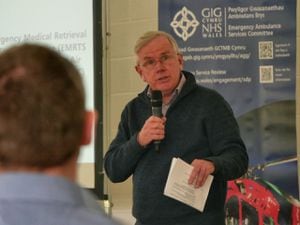Owen Paterson defends use of bees-link pesticide
Environment Secretary Owen Paterson today defended the Government's stance on pesticides which have been blamed for a dramatic fall in bee populations across Europe.

The European Commission is going ahead with a two-year ban on the chemicals, called neonicotinoids, after 15 of the 27 EU states gave their support yesterday. A ban is fiercely opposed by the British government. Mr Paterson spoke out after the vote in Brussels.
He claimed the evidence showed the controversial pesticides actually helped bee populations. The North Shropshire MP said: "We voted against the ban because, backed my chief scientists and the Government's scientific adviser, we all believe there has not been scientific evidence justifying the ban.
"All the prior experiments have been conducted in labs, and we call member states and the commission to see the results of our field trials, which dealt with real bees in real fields and showed that in areas where these pesticides were used, bees increased and the queens increased.
"More Europe-wide field trials are needed. This ban has been blundered on without being qualified. We have support from significant countries such as Italy and Hungary.
"We do not want to push on with a ban on one specific product when there is not a replacement plan ready.
"We don't want to fall back on older technology from the 50s and 60s which may be licensed but is still not good for the environment and may also not work, as the pests may be immune to them. This ban will significantly reduce food production."
There is great concern across Europe about the collapse of bee populations.
Neonicotinoid chemicals in pesticides are believed to harm bees and the Commission says they should be restricted to crops not attractive to bees and other pollinators.
Fifteen countries voted in favour of a ban – not enough to form a qualified majority. According to EU rules the Commission now has the option to impose a two-year restriction on neonicotinoids – and the UK cannot opt out.
EU Health and Consumer Commissioner Tonio Borg said work would start within weeks on putting in place a two-year ban on neonicotinoids used on crops such as oil seed rape, which are attractive to bees.
The Commission says it wants the ban to begin no later than December 1.
Mr Borg said: "Since our proposal is based on a number of risks to bee health identified by the European Food Safety Authority, the Commission will go ahead with its text in the coming weeks."
Greenpeace chief scientist Dr Doug Parr said: "By not supporting the ban, Owen Paterson has exposed the UK Government as being in the pocket of big chemical companies and the industrial farming lobby.
"Government policy should be evidence-based and the evidence in this case is clear – these pesticides are badly affecting bees.
"That Mr Paterson chose to ignore it does not bode well." Liberal Democrat MEP Chris Davies insisted there was sufficient evidence of a threat to bees to justify a ban.





